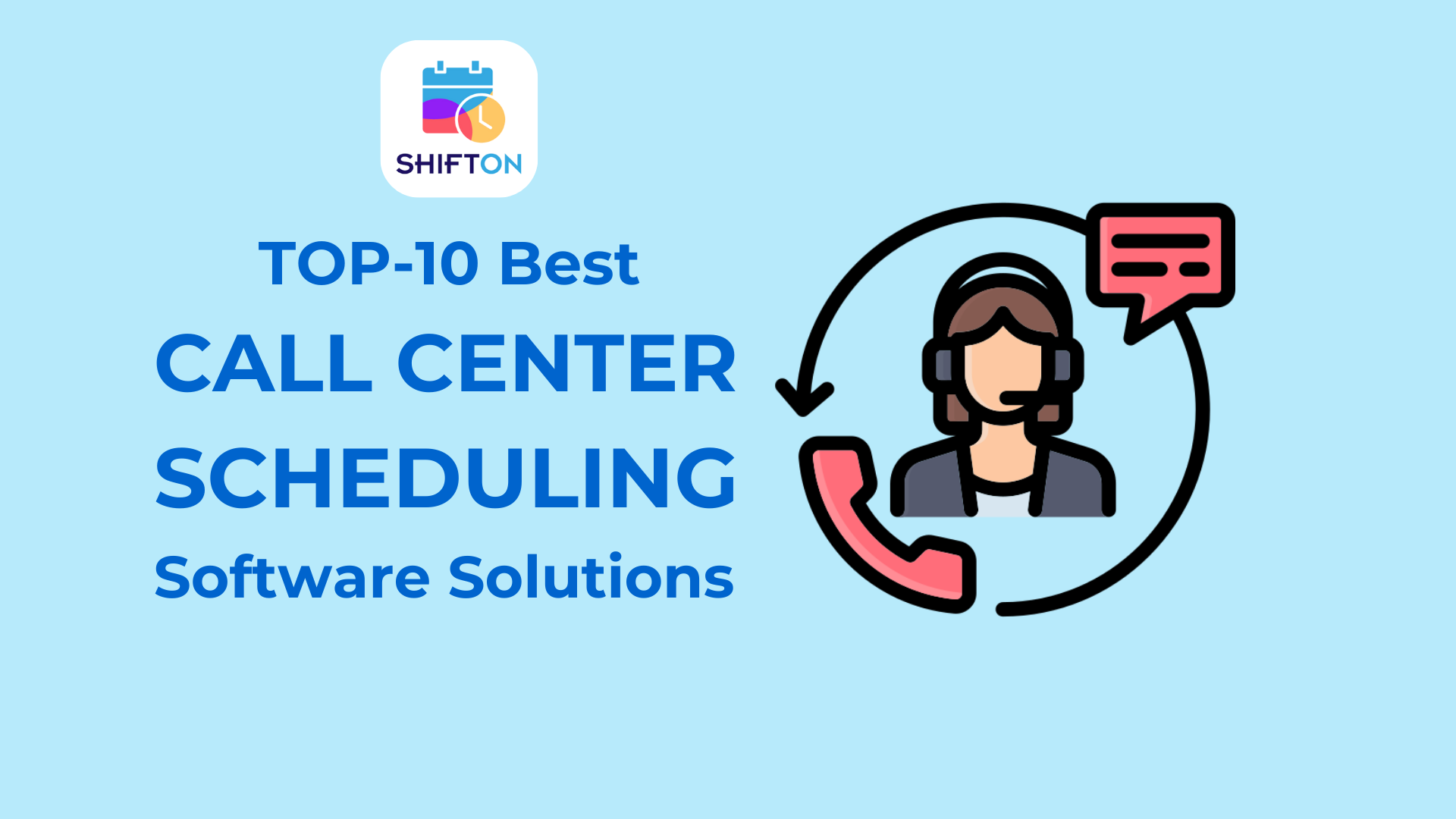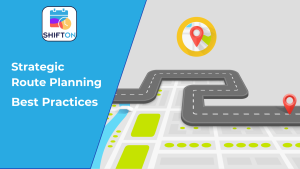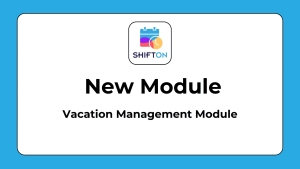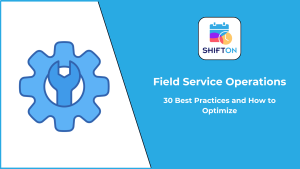Efficient top call centre software management necessitates careful planning and accurate scheduling. Ensuring that all shifts are covered, agents are engaged, and customer service runs smoothly may be challenging without the correct tools. Scheduling software for call centres could be beneficial in this circumstance.
These products aim to streamline the workforce management process whilst maximising agent output and reducing expenses. In this article, we will cover the top 10 scheduling software for call centres solutions that may help your business thrive, providing you with crucial insights, features, pros, and cons, along with guidance on how to choose the best tool for your requirements.
What Is Call Centre Scheduling Software
A specific tool, scheduling software for call centres is designed to assist contact centres in better managing their employees. It optimises client support and operational efficiency by scheduling an automation process, which ensures that the appropriate number of agents are available at suitable times.
Using this scheduling software for call centres, managers may create, distribute, and modify schedules that take into account a range of variables, including client demands, personnel availability, and peak call periods. It serves as the framework that manages call centre activities, increases overall levels of client satisfaction, and enhances agent productivity.
How Scheduling Software Can Benefit Your Call Center
In terms of call centre management, efficient scheduling software for call centres has several advantages that enhance customer and employee satisfaction. Here’s how your contact centre tool may be transformed by it.
The shift allocation process is primarily automated and simplified by scheduling software for call centres, saving time and effort compared to manual scheduling. By reducing the possibility of human errors, this technology ensures that sufficient agents are on hand during busy periods to answer incoming calls. As a result, agents are free to concentrate more on delivering excellent customer service rather than being bogged down by administrative work.
Furthermore, efficient scheduling software for call centres improves staff efficiency. Managers may plan schedules that match actual demand by using these tools, which analyse and forecast call volumes based on past call data. Better resource allocation and the avoidance of situations where contact centres are either overstaffed or understaffed are the ultimate results of this, which cuts operating costs and increases productivity.
Employing effective scheduling software for call centres can result in increased customer satisfaction, smoother operations, and higher employee morale. Contact centres may improve business outcomes by utilising technology to foster a more responsive and efficient workplace.
1. Higher agent productivity
Scheduling software for call centres ensures that agents perform effectively without being overworked or underutilised by automating shift assignments and job allocation. This reduces idle time and boosts overall output.
2. Enhances transparency
Transparency among the workforce is promoted by the implementation of contact centre solutions. Fairness and clarity are promoted by the fact that agents may request time off, switch shifts, and view their schedules via a single, centralised website.
3. Higher agent engagement
When flexible scheduling is combined with fair job allocation, agent morale and engagement are increased. Workers are more inclined to put forth their best work when they feel that their time is valued.
4. High-cost savings
Reduced scheduling errors, additional expenses, and no-show rates are all outcomes of effective scheduling. Businesses using the top scheduling software for call centres solutions benefit significantly from these cost savings.
5. Enhances customer experiences
Agents with a schedule are less stressed and more equipped to respond to enquiries from customers, which improves customer relations and satisfaction levels. Scheduling software for call centres helps to ensure the correct agents are available when needed to provide excellent customer service.
6. Facilitates quick internal communication
Teams stay in sync and the scheduled call app runs smoothly thanks to the capabilities of these scheduling software for call centres solutions that enable supervisors and agents to communicate instantly about essential updates or schedule modifications.
TOP-10 Call Centre Scheduling Software Reviews
Businesses seek the greatest call centre scheduling software to effectively oversee their employees and increase production. To keep your staff as organised as possible, we will examine the Top 10 scheduling software for call centres solutions in this study, paying particular attention to their primary features, benefits, and costs.
Shifton
Important features:
- Automated Scheduling: By automating the whole scheduling process, Shifton‘s platform reduces errors and frees up manager’s time.
- Employee Self-Service: By using a self-service portal, staff may view and swap shifts, which expedites communication.
- Forecasting: Shifton platform’s forecasting tools enable you to predict call volumes and staffing needs.
- Mobile Access: Using mobile devices to access the platform ensures that staff members can manage their schedules while on the go.
- Real-Time Updates: Shifton offers real-time updates on personnel availability and schedule modifications.
Advantages:
- An easy-to-use interface with quick onboarding.
- Flexible scheduling options to accommodate different industry needs.
- Employee independence via self-service tools.
- Customer support service.
Cons:
- Open API for any integration.
- Adding and inviting up to 100 employees.
- Different roles (administrator, manager, employee).
- Automated schedules (unlimited).
- Open shifts.
- Shift swapping/transfer.
- Overtime control.
- Night hours configuration.
- One project.
- Mobile app.
- API access.
Pricing: Offer a free version and provide a tailored price to larger teams.
RingCentral Contact Center
Important features:
- RingCentral Contact Center provides omnichannel assistance, which includes chat, email, voice, and social media support;
- AI-Powered Analytics: Gain a deep understanding of call volumes and labour productivity;
- Skill-Based Routing: Use skill sets to automatically route calls to the most qualified agent;
- Tools to Optimise Workforce: These include personnel planning and forecasting, both essential for contact centre management.
Advantages:
- Robust connection to more RingCentral tools.
- Sophisticated analytics tools enabling more insightful analysis.
- Reliable omnichannel support to improve client support.
Cons:
- Higher price compared to some competitors;
- May take longer to set up due to its complexity.
Cost: Get a quote from RingCentral by contacting them; prices vary depending on team size and requirements.
Deputy
Important features:
- Drag-and-Drop Scheduling: Use a visual drag-and-drop interface to easily create personnel schedules;
- Compliance tracking reduces legal risks by ensuring that schedules adhere to labour laws;
- Task management: Using the scheduling software for call centres, assign tasks directly to employees;
- Real-Time Attendance: Monitor worker attendance in real-time to avoid having too many or too few employees.
Advantages:
- A simple user interface enables quick generation of schedules.
- Robust tools ensure compliance with scheduling legislation.
- Payroll system integration.
Cons:
- Limited advanced features in lower-tier plans.
- It may be costly for larger groups.
Pricing: The scheduling plan starts at $2.50 per user monthly; higher-tier subscriptions include additional capabilities.
Talkdesk
Important features:
- Omnichannel Engagement: Provides customer service across various channels, including SMS, chat, and phone calls.
- AI Workforce software in call centre management: Effectively utilise AI-driven technologies in staff forecasting and scheduling.
- Call Monitoring and Reporting: Enables managers to create comprehensive reports and keep an eye on calls in real-time.
- Cloud-Based Solution: Remotely accessible and easily scalable.
Advantages:
- Strong automation and AI features.
- Team performance is enhanced by real-time call monitoring.
- The scalable option is suitable irrespective of team size.
Cons:
- Greater pricing range in comparison to certain rivals.
- New users may encounter a rather steep learning curve.
Cost: Based on the number of agents and features required, a custom price will be provided.
Shiftboard
Important features:
- Scheduling Process Automation: By automating the scheduling process, Shiftboard reduces the risk of human errors.
- Advanced Reporting: Offers comprehensive statistics on attendance and employee performance.
- Mobile App: Workers’ mobile phones can access schedules and updates.
- Employees may swap shifts if their manager agrees.
Advantages:
- Automated scheduling minimises administrative effort.
- Employee mobile access increases flexibility.
- Robust features designed to enhance workforce analysis and reporting.
Cons:
- Beginners may find the UI difficult to use.
- Few integrations with third parties.
Pricing: Enterprise-level pricing is offered, with a monthly starting price of £3 per user.
Assembled
Important features:
- Real-time schedule management: Modify schedules in real-time in response to personnel availability and call volume;
- Tools for Forecasting: Utilise past data to predict personnel requirements and adjust schedules accordingly;
- Time-Off Management: By allowing employees to request time off directly through the app, leave can be managed more easily;
- Integrations: Easily integrates with scheduling software for call centres and popular CRM solutions.
Advantages:
- Strong forecasting capabilities for precise scheduling.
- Fast modifications are possible with real-time updates.
- User interface that is easy to understand and use.
Cons:
- Limited options regarding customisation.
- Reporting features could be improved.
Cost: Based on the contact centre’s size and requirements, a customised price is provided.
NICE Workforce Management
Important features:
- AI-Driven Forecasting: Predict call volumes and staffing levels by using NICE’s AI-based forecasting solutions.
- Intraday Management: Use real-time analytics to modify personnel requirements throughout the day.
- Multi-skill scheduling involves assigning workers to appropriate calls according to their skill set.
- Comprehensive Reporting: Provides in-depth analysis of worker performance and call centre efficiency.
Advantages:
- Sophisticated AI-powered tools providing precise staffing.
- Efficiency is increased by real-time intraday management.
- Robust analytics and reporting features.
Cons:
- Increased cost due to premium features.
- Requires training to fully utilise its features.
Cost: Custom costs; contact NICE for a detailed estimate.
TixTime
Important features:
- Easy Scheduling: Provides a user-friendly interface that allows users to arrange the schedule of call centre representatives.
- Time tracking: Use the programme to keep track of staff members’ hours and attendance.
- Shift Alerts: Workers are informed of upcoming shifts or changes to their schedules.
- Payroll integration: Accurate compensation is ensured by smooth integration with payroll systems.
Advantages:
- Features that are easy to use and efficient in scheduling.
- Reasonably priced options suitable for small businesses.
- Simple payroll system integration.
Cons:
- Lacks advanced tools related to staff management.
- Limited reporting and analytics capabilities.
Pricing: It is among the more reasonably priced solutions, with a monthly starting point of £2 per user.
Humanity
Important features:
- Humanity uses automated scheduling to save time and ensure the right number of employees.
- Mobile Access: Using the mobile app, staff members can view and amend their schedules.
- Labour Law Compliance: Verify that the schedules you create comply with all applicable local labour laws.
- Employees can swap shifts easily as long as their manager approves.
Advantages:
- Highly automated to allow simple scheduling.
- Employees have more freedom with mobile access.
- Legal risks are reduced by compliance features.
Cons:
- Increased cost on advanced plans.
- There are limited options regarding integration.
Pricing: The starting price is £3 per user per month, with additional charges for advanced functionality.
Zoho Voice
Important features:
- Omnichannel communication facilitates effective customer interactions by supporting email, SMS, and phone calls;
- Call Recording: Record calls for quality assurance and training purposes;
- Real-Time Analytics: Provides call analytics in real-time so that team performance can be monitored and adjusted as necessary;
- Adaptable API Integration: Integrate Zoho Voice with the helpdesk and CRM applications you currently use.
Advantages:
- Strong support across all channels ensures seamless communication.
- Real-time analytics provide immediate insights.
- Affordably priced options are available for small and medium-sized enterprises.
Cons:
- Lacks some advanced features available in premium systems;
- Limited resources for workforce management.
Pricing: One of the most economical solutions, starting at £1 per user each month.
Compare Table Call Centre Software
Making the right choice to achieve the best scheduling software for call centres may be made easier with a clear comparison of the leading options. The comparative table that follows lists the main features, costs, and ease of use of various call centre scheduling solutions.
| Software | Key Features | Pricing | User-Friendliness |
| Shifton | Real-time reporting, shift swapping, employee self-service, and AI-driven scheduling | Free version, contact for pricing for large enterprises | A user-friendly interface that integrates seamlessly and enables smooth navigation. |
| RingCentral Contact Centre | Workforce management, automated call routing, and omnichannel support | Contact for pricing | Rich in features, but considerable training is needed to fully utilise it. |
| Deputy | Payroll integration, shift switching, automatic scheduling, and time tracking | Starts at $2.50 per user/month | An easy-to-use platform with adaptable features suitable for various business needs. |
| Talkdesk | Advanced analytics, omnichannel capabilities, and labour management driven by AI | Contact about pricing | A contemporary interface that prioritises customisability and simplicity of use |
| Shiftboard | Employee scheduling software call centre, compliance tools, real-time reporting, and demand forecasting | Starts at $3 per user/month | Adaptable and all-inclusive platform, while initial setup may be difficult |
| Assembled | Demand forecasting, shift management, and optimal scheduling | Contact about pricing | Simple to use, with adjustable scheduling capabilities, ideal for medium-sized enterprises |
| NICE Workforce Management | Multi-channel support, real-time performance metrics, extensive scheduling capabilities | Contact about pricing | Highly adaptable; however, individuals without a technical background will require additional training. |
| TixTime | Flexible shift assignments, performance metrics, and employee scheduling | Starts at $2 per user/month | User-friendly tools featuring an effective UI, ideal for small to medium-sized teams. |
| Humanity | Timekeeping, real-time reporting, dynamic scheduling, and mobile access | Starts at $3 per user/month | Extremely user-friendly and mobile-optimised design allows for effortless control while on the go. |
| Zoho Voice | Real-time monitoring, omnichannel communication, and automated scheduling | Starts at $1 per user/month | Easy to navigate and straightforward, particularly suitable for small and medium-sized enterprises. |
How to Choose Call Centre Scheduling Software
Selecting the best scheduling software for call centres for your contact centre requires weighing several considerations, including features, affordability, convenience of use, and integrations. Let’s examine the factors to consider regarding each of these elements.
1. Integrations
To guarantee that your scheduling software for call centres functions flawlessly with the other instruments in your contact centre, integrations are essential. The entire effectiveness of the contact centre is increased by its capacity to interface with analytics platforms, phone systems, chat software, and Customer Relationship Management (CRM) systems.
Important scheduling software for call centres to look for include:
- CRM programmes such as Zoho CRM or Salesforce, facilitate smooth data transfer between staff schedules and customer contacts.
- Tools that manage the workforce by linking timekeeping, performance evaluation, and scheduling.
- Communication platforms, including chat programmes and VoIP services, that integrate with scheduling to ensure staff members are accessible when needed.
- HR and payroll systems that simplify the management of employee hours, requests for time off, and payments.
Data silos can cause operational disruptions and lower team effectiveness in your contact centre if they are not properly integrated.
2. Features and functionalities
A call centre schedule software solution needs to be jam-packed with features that aid in workflow optimisation as well as schedule management. Typical elements that improve scheduling effectiveness are as follows:
- Automated Scheduling: Assign shifts automatically per worker availability, skill levels, and call volume requirements.
- Real-time Monitoring: Monitor and modify schedules in response to sudden increases in call traffic or personnel shortages.
- Self-Service Options: Give staff members the ability to use the platform to manage their schedules, switch shifts, or seek time off.
- Forecasting Tools: Make more accurate scheduling decisions and reduce instances of overstaffing or understaffing by using past data to forecast future call traffic;
- Analytics and Reporting: Detailed reports that facilitate data-driven decision-making for supervisors by assisting them in understanding trends, performance measures, and staffing requirements.
Because of these qualities, workforce management can be approached more proactively, guaranteeing that agents are where they should be when they should be and that the scheduling system is adaptable enough to handle unforeseen spikes in demand.
3. Pricing
When selecting scheduling software for call centres, cost is an important consideration. To ensure you receive value from your purchase, it is essential to compare the price and the features offered.
Typical call centre scheduling tools provide:
- Per user/month pricing: Many scheduling software for call centres solutions charge based on the number of users, which can be beneficial to small to mid-sized teams. TixTime software, ideal for small call centres, starts at $2 per user per month.
- Unique pricing: Based on the scale of the contact centre and the particular features needed, enterprise-level systems such as NICE Workforce Management and Talkdesk frequently provide unique pricing.
Take into account the following while assessing pricing:
- Scalability: Can the scheduling software for call centres handle additional agents and sophisticated features as your company expands?
- Costs associated with support and training: Certain platforms may charge extra for comprehensive onboarding or premium assistance;
- Features: Does the programme have several price tiers that, as you go up, unlock more features?
Making an educated choice requires weighing the potential of the scheduling software for call centres to increase operational efficiency against its cost.
4. User-friendliness
How simple it is for your staff to use and adjust to the scheduling software for call centres is determined by its user-friendliness. A simple design can increase adoption rates and general happiness, whereas a complicated interface may result in inefficiencies and even opposition from staff members.
The following criteria should be used to assess user-friendliness:
- Software should have an intuitive interface with easily navigable menus, straightforward dashboard designs, and readily available tools for scheduling, switching shifts, and producing reports;
- Mobile Accessibility: Since many best contact centre software representatives work from home, having a smartphone is essential for receiving real-time schedule changes. Mobile-friendly platforms are provided by tools such as Deputy and Humanity, which enable managers and staff to oversee schedules while on the go;
- Minimal Learning Curve: Introducing new staff to a scheduling software for call centres solution should not take a long period, especially in big contact centres. The best platforms are ones that have helpful staff, help centres, and guided lessons.
Selecting an easy-to-use platform guarantees that managers and staff can rapidly adjust, cutting down on downtime and increasing output.
The Bottom Line On Call Centre Scheduling Software
Scheduling software for call centres is necessary to maximise staff management in contact centres. Through the optimisation of shift assignment, performance monitoring, and data analysis, these solutions support the maintenance of appropriately staffed and effectively operating software contact centres. They enable managers to deploy resources wisely, distributing workloads and lowering the possibility of either an overstaffing or understaffing situation, which might result in lower service quality or higher operating costs.
Advanced scheduling software for call centres also offers real-time reporting and analytics capabilities, which empower managers to make data-driven choices on resource allocation and staffing. These insights are useful for predicting future staffing needs, detecting peak hours, and analysing call traffic patterns – all of which lead to increased customer satisfaction and productivity.
It is important to take several important things into account when choosing the best scheduling software for call centres, such as integrations, price, usability, and necessary features. Integrations with other corporate systems, such as CRM and HR software, may considerably expand the usefulness of the scheduling tool, allowing for easy data exchange and enhancing overall productivity.
In conclusion, carefully evaluating the unique requirements and goals of your company is essential to choosing the best scheduling software for call centres. Contact centres may optimise their workforce management procedures and increase customer happiness, performance, and operational efficiency by utilising the appropriate technologies.





